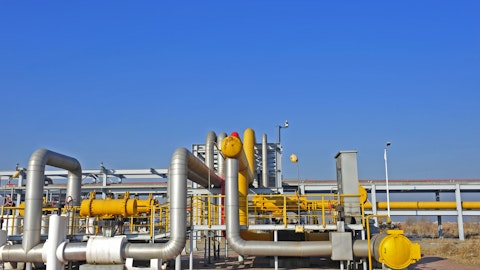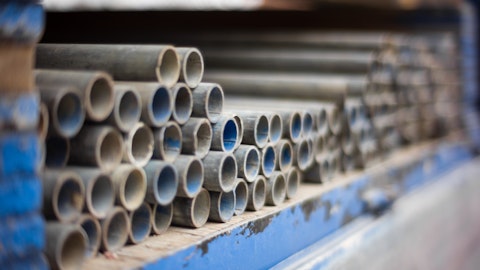Arun Jayaram: Yeah, good morning. My first question is on the US, perhaps for Luca. I was wondering if you could comment on what you’re seeing in terms of the import of products into the US. How is lower pricing impacting imports into the US?
Paolo Rocca: Thank you, Arun. Luca, you can comment on these, because it is…
Luca Zanotti: Yes, and I can tie back to what, Paolo, you were saying on the inventory. So, when you look at the imports, we have seen imports to go down, and this is basically, with the exception of Koreans that are complying with their quota quarterly, I mean, all the importers have come down, both ERW and seamless. Now, one thing that was not mentioned before, but it is important is there also the domestic production, especially on the ERW side, came down, which helped reducing the inventory on the ground during this month. But getting back to your point, obviously, as price goes down, some importers will start to face the 25% imposed on the Section 232, especially as they complete their quota. And in the case in which we’re going to see a recovery in demand starting 2024, obviously this is going to have an impact on the possibility of some very low imports to come in.
However, we believe that the imports are high and this is a problem that the domestic industry is going to take care of.
Arun Jayaram: Okay. And just a quick follow-up is, what about the potential — if the imports are declining into the US, could that impact international pricing if the imports find a new home?
Luca Zanotti: Well, I don’t think there is a clear overlapping because — between the material that some company is importing in the States and the international market. For instance, the space for welded product outside the United States is very limited. I mean, the demand — international demand is different. There could be some redirection of import, but it is a much lower scale to what is imported in the States because the overlapping — also, this is a market in which qualification, establishing the product in every different place in the different companies is a complex process. In the US, it is easier for a producer with relatively limited experience and track record to penetrate or some segment of the low-end in the market.
Arun Jayaram: Great. And, Paolo, I just want to get quick thoughts on the Argentinian election. Obviously, there is a candidate who is proposing dollarizing Argentina, but just some quick thoughts. I know we still don’t know the outcome yet.
Paolo Rocca: There is — we are in an election process. There will be a ballotage in 19 of November. Whoever wins the ballotage will assume the Presidency on the 10th of December. I think that whatever the outcome of the ballotage, there will be the need in Argentina for an adjustment program that will require a reduction of public spending, devaluation, and it is possible that economic activity may be reduced to, let’s say, align some of the variables that today are out of the normal situation for a country like Argentina. So we will see is, there is no clear indication on the results of the ballotage and there is no clear indication on the program that will be implemented after the assumption.
Arun Jayaram: Okay, thank you.
Operator: Thank you. One moment for our next question, please. It comes from the line of Marc Bianchi with TD Cowen.
Marc Bianchi: Hi, thank you. Maybe following up to the last question, you had previously discussed some concern on South America in the back half of the year because of election uncertainty. Could you talk about how that evolves? Obviously, there may be still some uncertainty for Argentina but the rest of the region and thoughts heading into ’24 would be helpful.
Paolo Rocca: Well, I mentioned Argentina, as I say, we expected that after the assumption Argentina will need to implement, as I was saying, an adjustment program that will have some impact on, as I say, the exchange rate, public spending. No doubt, to some extent we may expect a reduction of the level of economic activity, but any government will need to promote export and attraction of investment. Argentina has a very important potential for attractive investment in the oil and gas sector, in the agricultural sector, in lithium, in development of lithium, in development of renewable and in other area of its economy. I think this will be part of the program of any of the two candidates. And also the condition of the agricultural sector in 2023 has been extremely difficult due to the drought that affected the country.
This will help the next government in facing the challenges of the adjustment process. So this is where we stand and I think that in the case that the program is successful, the need to develop infrastructure in the energy sector for oil and gas is very relevant. We think that there are potential in Vaca Muerta. It is very important. As far as Brazil is concerned, Brazil is more stable, developing its oil and gas industry. Petrobras has very ambitious target for increasing its production level. Contracts like the one that we signed with Equinor are indicating that also the private sector and private companies are investing in Brazil, with large projects that have relevant infrastructural content, areas in which we participate from Confab in all the segments of drilling and evacuation line pipes that are used for this.
In the case of Mexico — also in the case of Mexico, it will be logical for Mexico to, after the new refineries coming upstream, to invest in the energy sector and to support financially Pemex. And also, too, what we see today is that there are private companies investing in the development of Mexican resources, but it is also true that the financial situation of Pemex is very difficult. And we, as other companies in the oil service system, in this moment, are facing some delay in payment from Pemex. It will be very important over the coming months, let’s say, for Pemex, at the same time, to expand its operation if possible and also to reduce the payable to part of a supplier. One of this is Tenaris. In the case of the rest of the Latin America, in Colombia, after the election, we expect that some of the decisions in the oil and gas sector may be reconsidered.
And I feel there could be also, in the case of Colombia, during 2024 and 2025, let’s say, some recovery from the situation where we are today, after the reduction during 2023 that has been pretty strong, either stable or improving.
Marc Bianchi: Okay. Thank you for that, Paolo. I want to ask a couple more quick ones on sort of the direction of direction of business over the next couple quarters. Volumes were down 17% in third quarter. It sounds like you’re anticipating volumes to improve in the fourth quarter. I’m curious if you think a million tons a quarter is sort of the right number to be thinking about for fourth quarter and entering 2024, and then if there’s any regional comments around that.
Paolo Rocca: Yeah, you’re right. I mean, this is what we expect. The situation in Argentina may influence some of the decision on the pipeline and moving this in time between the different quarters, but basically we are in the range that you mentioned. This is what we expect in the coming quarter.
Marc Bianchi: Okay, great. And then the other one was just related to profit per ton. The guidance of 25% to 30% or so for the fourth quarter would suggest you’re maybe over $800 a ton of EBITDA. The long-term average has been around $500, and there’s another company out there saying the normalized price or average margin is $500. Do you think you can maintain this $800, and why do you think it would be better than the long-term average?


